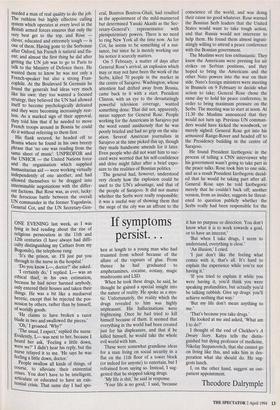If symptoms
persist. . .
ONE EVENING last week, as I was lying in bed reading about the rise of religious persecution in the 11th and 12th centuries (I have always had diffi- culty distinguishing my Cathars from my Bogomils), the telephone rang.
'It's the prison, sir. just put you through to the nurse in the hospital.'
`Do you know L—, doctor?' she asked.
'I certainly do,' I replied. L-- was an ethical thief, in his own estimation, because he had never harmed anybody, only entered their houses and taken their things. He was a bit like a mediaeval heretic, except that he rejected the pos- session by others, rather than by himself, of worldly goods. 'He claims to have broken a razor blade in two and swallowed the pieces.' 'Oh,' I groaned. 'Why?' 'The usual, I expect,' replied the nurse. Evidently, L— was next to her, because I heard her ask, 'Feeling a little down, were we?' I didn't hear his reply, but the nurse relayed it to me. 'He says he was feeling a little down, doctor.' People swallow all kinds of things, of course, to alleviate their existential crises. You don't have to be intelligent, articulate or educated to have an exis- tential crisis. That same day I had spo- ken at length to a young man who had truanted from school because of the allure of the vapours of glue. From thence he had graduated to amphetamines, cocaine, ecstasy, magic mushrooms and LSD.
When he took these drugs, he said, he thought he gained a special insight into the nature of reality. He spoke as a mys- tic. Unfortunately, the reality which the drugs revealed to him was highly unpleasant. His hallucinations were frightening. Once he had tried to kill himself because of them. It seemed that everything in the world had been created just for his displeasure, and that if he killed himself, he would take the whole evil world with him.
These were somewhat grandiose ideas for a man living on social security in a flat on the 11th floor of a tower block (or indeed for anyone) to entertain, but I refrained from saying so. Instead, I sug- gested that he stopped taking drugs. 'My life is shit,' he said in response. 'Your life is no good,' I said, 'because it has no purpose or direction. You don't know what it is to work towards a goal, or to have an interest.'
'But when I take drugs, I seem to understand, everything is clear.'
'An illusion,' I cried.
'I just don't like the feeling what comes with it, that's all. It's hard to explain the experience while you're not having it.'
'If you tried to explain it while you were having it, you'd think you were speaking profundities, but actually you'd be talking rubbish. Give up drugs: you'll achieve nothing that way.'
'But my life don't mean anything to me.'
'That's because you take drugs.'
He looked at me and asked, 'What am Ito do?'
I thought of the end of Chelchov's A Dreary Story. Katya tells the distin- guished but dying professor of medicine, Nikolay Stepanovitch, that she cannot go on living like this, and asks him in des- peration what she should do. He sug- gests lunch.
I, on the other hand, suggest an out- patient appointment.
Theodore Dalrymple


























































 Previous page
Previous page